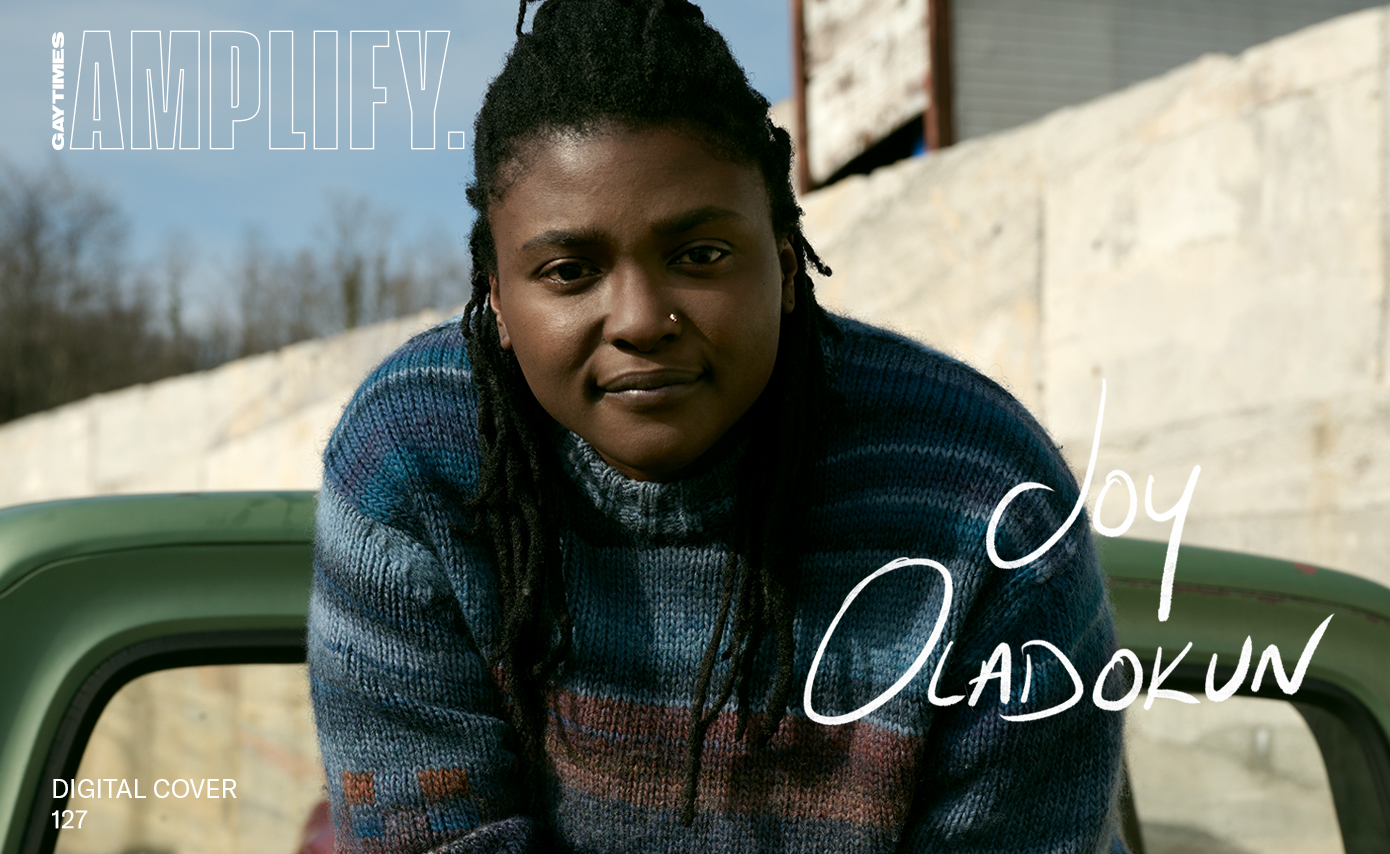
Joy Oladokun’s ego doesn’t exist, they tell me, as we’re cooped up inside a side studio room in Universal Music’s London office. It all happened after she took a “really big dose” of mushrooms. “I think my ego evaporated,” they quip. The newly settled Nashville resident has been thinking about their space in the existing music industry. It’s midday and their new album, Proof Of Life, is about to be ready for the world.
Oladokun, whose music is profoundly intimate, reels you in with its artful country warmth and slick, well-versed lyricism. The breakthrough musician made their mainstream mark with their third album, In Defence of My Own Happiness, which brought Oladokun’s strengths as a lyricist and creative to the forefront. A largely DIY project, the artist created a hopeful home of music when many of us needed it most.
Now, on their latest album, Oladokun carves out a folksy low-fi pop palette and gracefully wades into sticky topics, surveying their relationships with faith, and the American politics that surrounds them. Putting their optimism first, Oladokun comes out the other side showcasing understanding even when there’s no direct answers to be had. Sitting in a calm, reflective mood, the Proof Of Life creator joins us to discuss their new music, the value of art and how they ended up receiving a Grammy nomination without knowing about it.
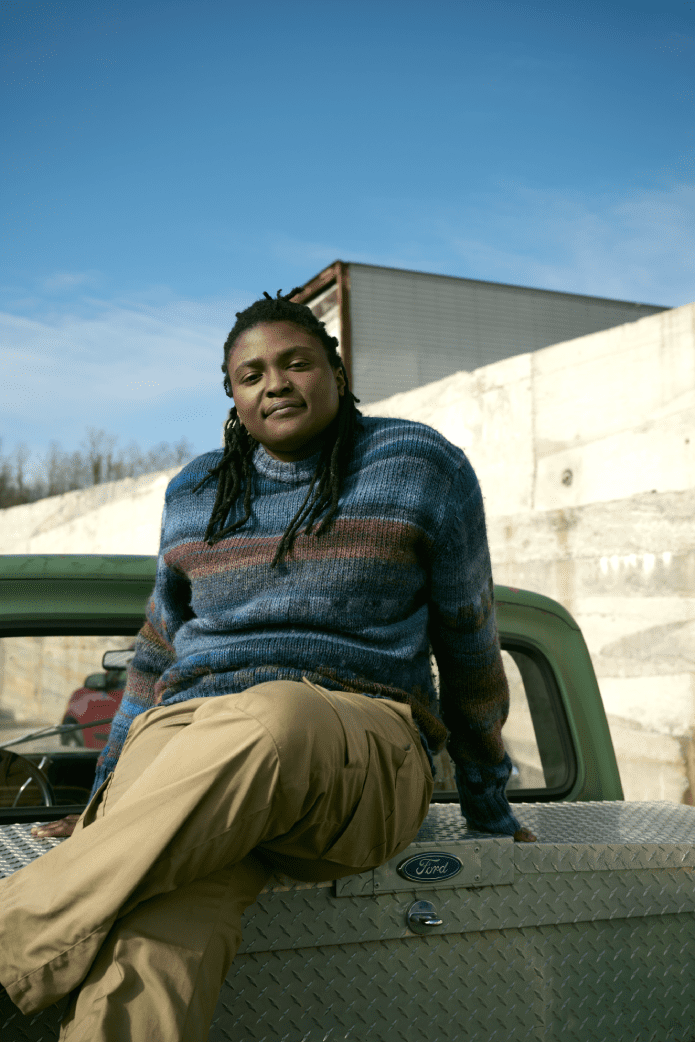
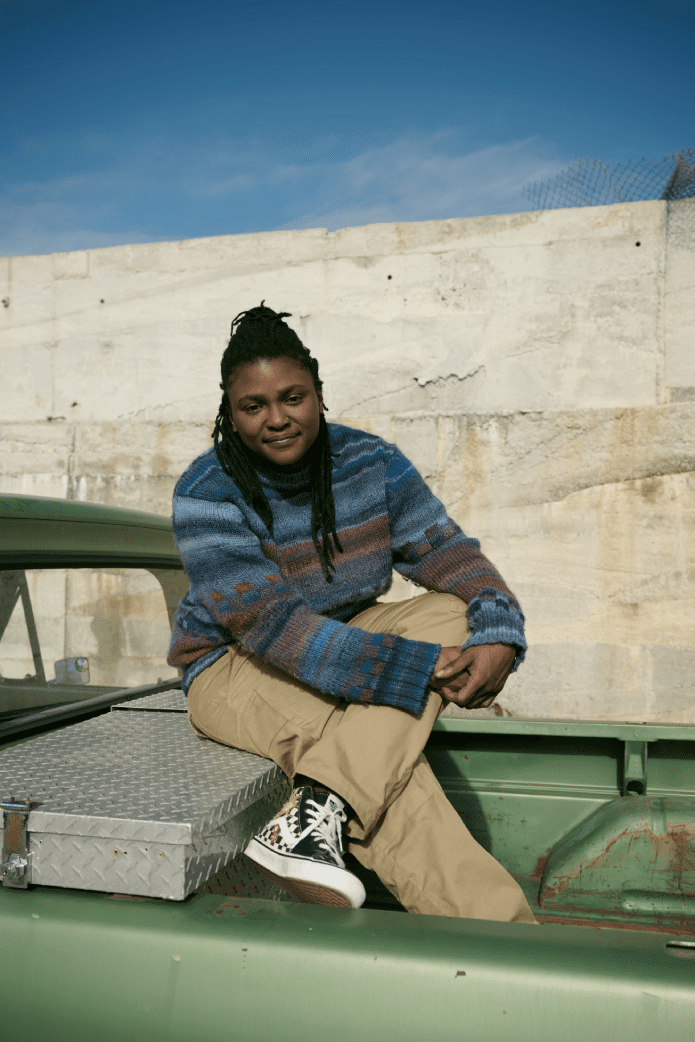
Your music is thoughtful and guides us towards images of hope. How would you describe the motive behind your music?
Ultimately, it’s healing and connection. A lot of the times when I set out to write, I’m usually processing something like a feeling, fear, or even triumph. Whatever the emotion is, I’m stuck and it feels big. Music helps me come to some sort of conclusion and the reason that I share it is to connect with people. The most powerful thing about what I do is the part where people say ‘You said this thing that he thought was so specific, but I feel that way, too’. I think it allows a lot of different people from different places to connect just over the way life makes us feel.
Everything seemed to change in the last couple of years for you. You self-released your first album, you’ve performed on The Late Show With Stephan Colbert, and now you’re a signed artist. What has that upward growth been like for you?
It’s been good. As a human, I’m a big proponent of not skipping steps so, for me, I feel like everything has happened at the time that it feels most appropriate for me. I have a good sense of self, what I want to say, the legacy I want to leave and the presence I want to bring into this world. I don’t know if I had that totally figured out on my first record.
What’s so cool about music right now is that technology has allowed us to go from having these expensive studios that only select a few who had to be cherry-picked where now you can make something in your bedroom. In the first record, I demoed every single one of those songs in my studio apartment in Los Angeles by myself. Then, I hired a band to help me play them and it’s really cool to go from that to recording part of my latest record at Electric Lady.
I feel such an appreciation not only for the present but also for the journey that it took to get here. I’m glad I spent time figuring out how my little computer worked because it gave me confidence, when I entered a nice studio room for the first time, to say here’s what I need. It feels really good. I appreciate the growth.
With that, it seems like you’ve been able to cultivate your own sound without people telling you what to do…
There’s still some of that as a Black person. A lot of the time the assumption is that I should make soul R&B, hip hop or throwback. Sometimes, the views of Blackness in media are so narrow and, even starting out playing shows, some of my inclinations were ‘If I don’t bend this in a certain way, will people even recognise what I do?’ This is a part of the growth too and learning I don’t have to sound like a certain thing to get my point across. It’s actually been more successful, the more authentic I’ve been to myself.
Do you feel like those expectations are starting to fall by the wayside?
I don’t even know if that’s down to trust between me and my fans or the people who listen to my music. It’s like an internal trust. As we start as creatives, the point is you see someone doing something that you so you imitate it and chart your own course. With my own work, I feel like it is that.
On every album, there’s this cool trajectory where you can see the growth. From my first album, there’s the piano ballads, this swingy, soulful, Americana but then you can see the through line to this next record where there’s a Weezer-meets-Beatles number, and there’s a song with a hip hop feature with Maxo Cream. There are all these different sounds and textures. It’s more about me going that this might be what inspires me and told me that I could get into the game, but it doesn’t have to stay that way. I can follow the rest of my inspirations too.
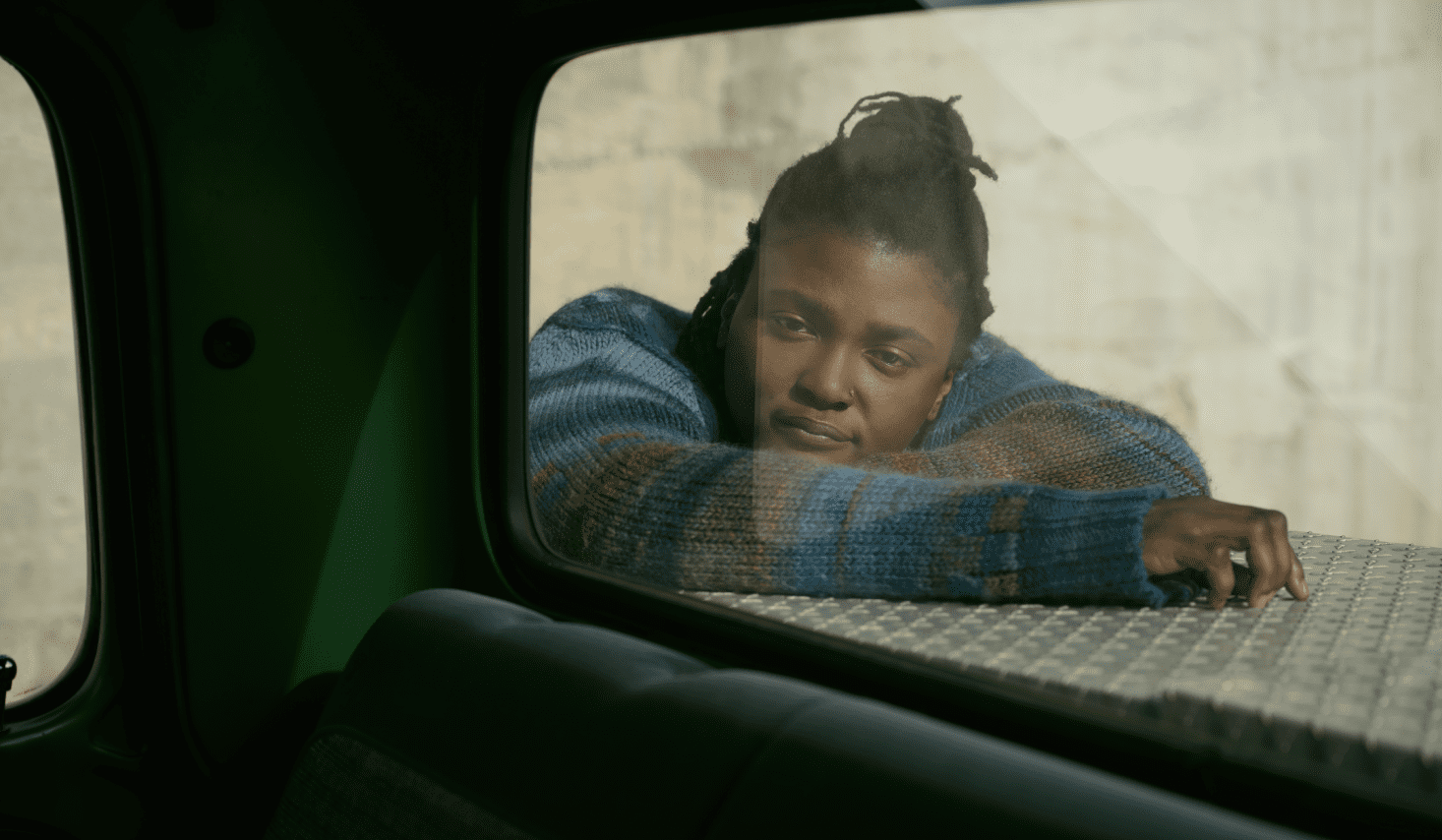
You’ve had collaborations with Marren Morris, Noah Khahan, Chris Stapleton, and more. What draws you to collaborations?
It’s all music I love. What becomes most apparent, especially on this record, I’m the product of the playlist generation. I love albums but I also have a life and a job so playlists can span every single genre. In the same way that my hope, values-wise, is that my work builds a bridge, for me, a Black queer person, to do a song with country acts like Maren Morris or Chris Stapleton. One says this person listens to country music but I get to also meet them where they are and then create something new allowing people to see the fruit of what happens when different cultures collide.
A lot of my goal in collaboration is not for clout. I’m honestly, shocked every time someone says yes! it really a question of what we make and that speaks to the rareness of the fact that we met. I hope that comes across and that’s the goal and the feeling.
We’ve been talking about hopefulness and your opening track, Keeping The Lights On, taps into that. Can you tell us more about that song?
Thank you for listening that does mean a lot. The fact that people spend their time and attention listening to music still blows my mind. I wanted to open the album with Keeping The Lights On because it feels a lot like talking to me for the first time. You get a sense that she’s from Arizona, she lived in LA for a little bit, she’s gay, you know, and she’s driven towards hope. As a writer, a lot of times I’ll start with the really specific things and by the chorus try to open it up, almost like asking somebody a question back. I don’t want to be the central focus. I want to create a space for people to process and feel things.
The people you worked with on that track are really interesting too…
I wrote it with my friends Mike Elizondo and Ian Fitchett and it’s honestly crazy to call them friends. They’re both producers that I really respect. Mike Elizondo worked with Dr. Dre back in the day, but also with Fiona Apple and Twenty One Pilots and Ian did Kacey Musgrave’s Golden Hour and Starcrossed. They’ve become friends and mentors. I always come in and I sit on Mike’s couch and share what I’ve been thinking about. I was questioning why am I so driven towards hope. After all the things that I’ve been through, why do I still want to hope so badly? He started playing that sort of plucky thing and I start basically singing my feelings. I don’t want things to feel too written. I want it to feel as close to having a conversation with me as a human would feel.
Your song Pride is beautiful. It felt like a connection with yourself and your community. Would you agree?
I think it was all of it. I had just moved to Nashville when I wrote Pride, and it was the first city I had moved to as an out queer person. I was coming out of the closet when I lived in Los Angeles. So, in Nashville, it was just established I’m a queer person and this is the vibe, but it’s also the South of America. There’s basically no part of America that is as progressive as it thinks it is. But, the South can tend to feel more oppressive when it comes to issues of race and sexuality. It’s hard to feel pride as a queer person, but it’s a word that is associated with the queer movement, but I don’t know, a tonne of people except for like, hot twinks that feel pride all the time.
How did you navigate the sense of pride alongside accepting your queerness?
I was in my 20s when I started coming out of the closet. I finished college and quit my job at a church. I didn’t know what I wanted to do which is a fair decision to make at 22, no matter what God you believe in anyway. I got to a place in myself knowing that I’ve been queer since I was a kid. Having spent my life in pursuit of spirituality and religion, I wanted to be able to find a way to let those two things coexist in me holistically, without having a white dude over my shoulder, every weekend, saying that it’s a sin to be gay while he sucks down shrimp at TGI Fridays after.
Another fact people might not realise but you appeared on MUNA’s self-titled album. How did that crossover come about?
Naomi tweeted whether anybody living in LA could play the saxophone. I was like I don’t live in LA but it’s 2023. So, we both realised that email exists and they sent me the tracks, I’m not the world’s greatest saxophone player but I do have a proficiency with sax and trumpet so I did some stacks or certain songs on that project. It was Loose Garment and something else.
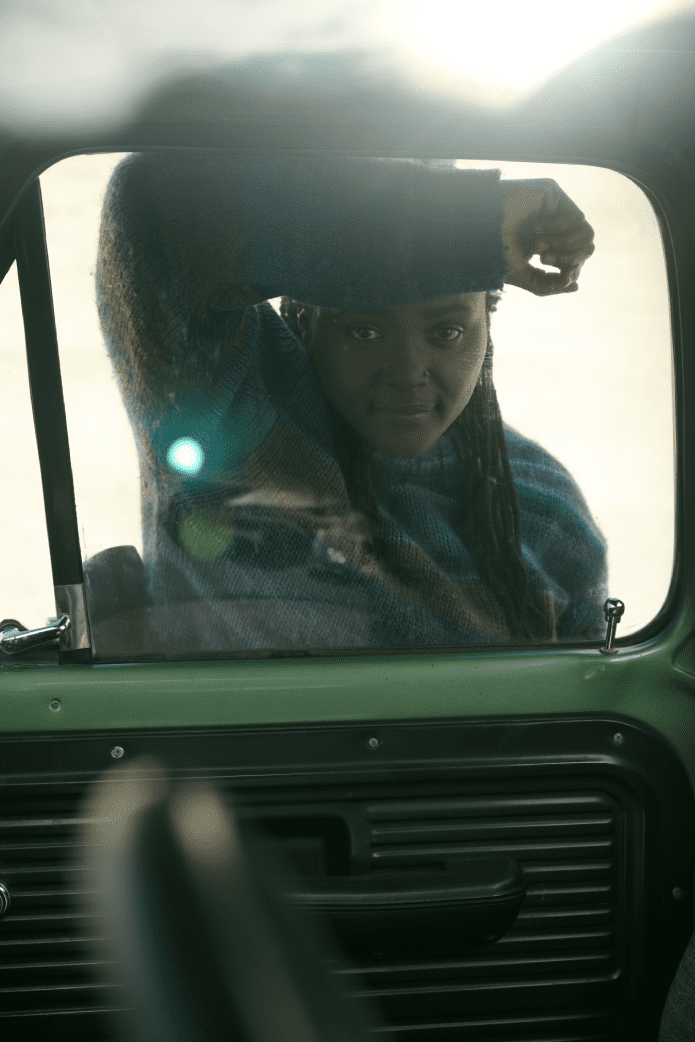
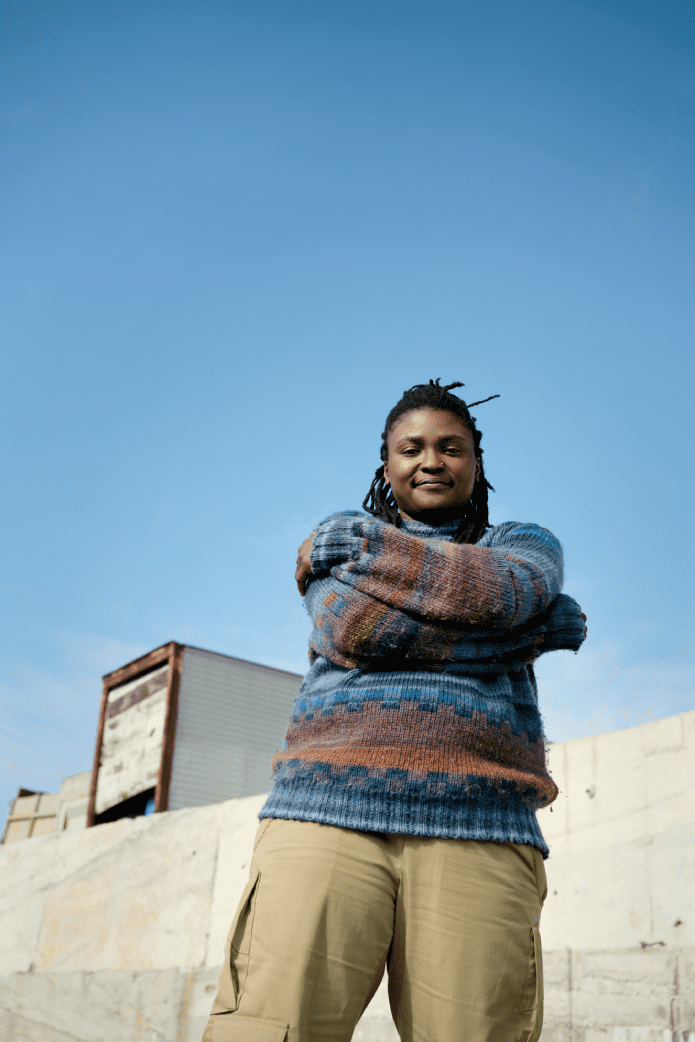
What do you consider to be your most personal lyrics?
There’s a line that says: ‘It’s the least that God could for giving more than he could handle to somebody like me’. I think about people who are religious and homophobic. It’s a joke. Time and context and looking at the heart of the meaning are so important and I just think that that has gotten lost in religion entirely.
When I read the text, I see guidance for living well, treating people well and being hungry for justice and fairness. I don’t see what’s fair about preaching mercy and then locking someone out of it because they don’t fit your expectations. I’m saying from a when you look thematically.
What makes the Quran, the Bible, the Tanakh, or the Torah compelling, it’s all centred around centuries of people searching for the divine and life and trying to find the best, healthiest way to live. It challenges religious people to like, put their money where their mouth is.
Every decade there’s an issue that challenges people of faith. I think queerness is it now and before it was racial tensions in different countries, especially with colonialism. Back to the relationship thing, we’re all learning how to live with and love each other and I think that that should be the most important thing. You cannot want good for yourself and try to deny it to someone else. It cannot be both. I don’t think any version of God rewards that because it’s injustice.
Your songs and writing are intensely intimate and personal. How do you channel that into your writing?
So much of why I’m writing is based on how I view the world and my mission statement. It has to start with how I’m feeling and what is on your heart or what’s trying to get out like that song. That song we just talked about, Somebody Like Me, I woke up and I got on Twitter and like there was a Christian pastor saying something homophobic.
I always write from a place of what I’m processing and this is why I’m frustrated. For me, I want to come to like a healing and hopeful conclusion. I don’t like to hang on to negative energy. Music is my way of taking any energy that’s negative or confusing and giving it a home for three minutes. It’s not always about coming to answers. It’s mostly just about putting it on paper.
I have a song called Trying that’s about when I got nominated for a couple of awards in the States. But, also, my parents were going through a hard time. The whole song is just about how I’m addicted to trying even though there are some days where I feel like it I do not think that I will win. For me, writing music isn’t always about coming to conclusions. It’s more about giving space to something that seems like it might need it.
Now you’ve got Proof Of Life out. What’s your next big ambition?
It’s not that I have no ambition — I’m literally in my label’s building saying that! My favourite artists are the artists who have been in competition with themselves their entire lives, their entire careers. For however long I do this, I want to keep doing it well like a little bit better each time and the ability to track progress whether it’s creative or as a producer or guitar player, I don’t care if I play arenas tomorrow. I don’t have any dream collaborations left. I just want to make stuff with people who want to make stuff with me and leave the rest. I don’t know if it’ll win Grammys or BRITs – I don’t know if that’s for me. I exist in this interesting space. I’m going to make stuff as long as it feels life-giving.
Are music awards or industry approval something this interests you?
If I win a Grammy does that add value to what I do? If the Grammys didn’t know it existed, would that make it not valuable? You’re only rating and celebrating what you hear and how you hear it. It’s only about people’s preferences, and not in a way that knocks it, but, for me, the thing that is gratifying is mostly in the making and occasionally in the sharing in the sense of what allows people to connect over it and everything else is extra.
I got an email that I was nominated, last year, for a Grammy – the day after it happened, it was crazy! I thought that was cool because I didn’t know. Had they not emailed me, it wouldn’t have really made a difference. It’s not that there’s no value, but part of it is perceived. Perceived doesn’t serve me a tonne. It does feel nice to have people appreciate what you do. So, I’m not gonna say that I don’t want one, I’m just going to be honest, in the sense that like, I don’t even know if what I do is good enough to get them so I’m not going to carry myself around asking for them.
That MUNA record didn’t get nominated or YEBBA didn’t get nominated! The people who get rewarded are good but there could be a kid making something in his basement that blows everything that was released last year out of the water who doesn’t have the confidence or the resources. The awards are beautiful if we can also keep in mind that there’s a world of art that we may never even get to see and experience because we created this little fun fest.
Joy Oladokun’s studio album Proof Of Life is out now.